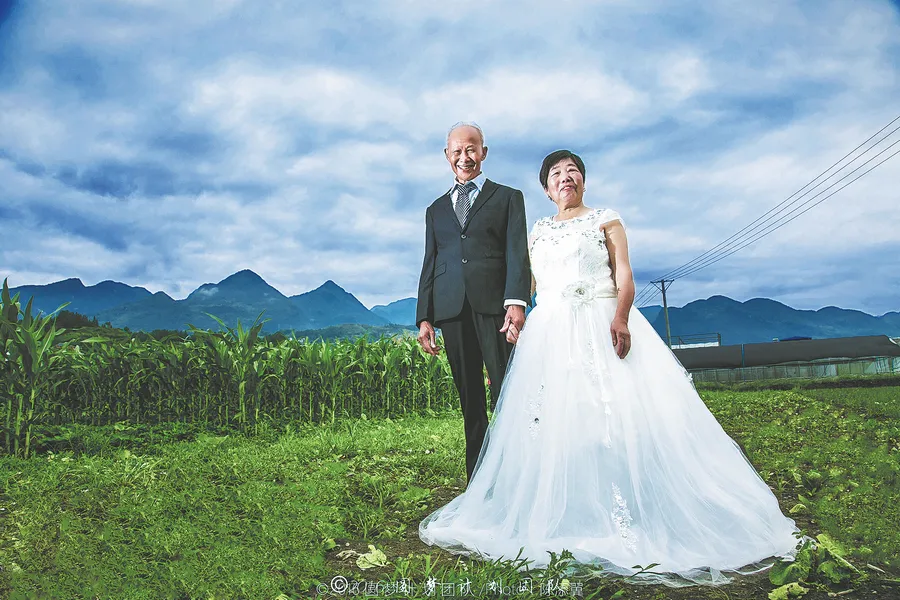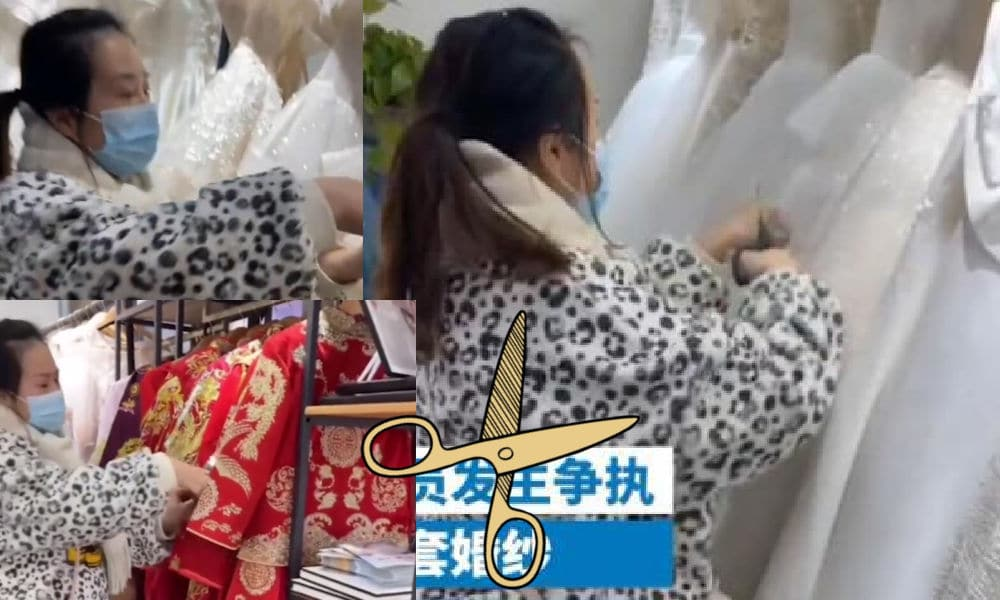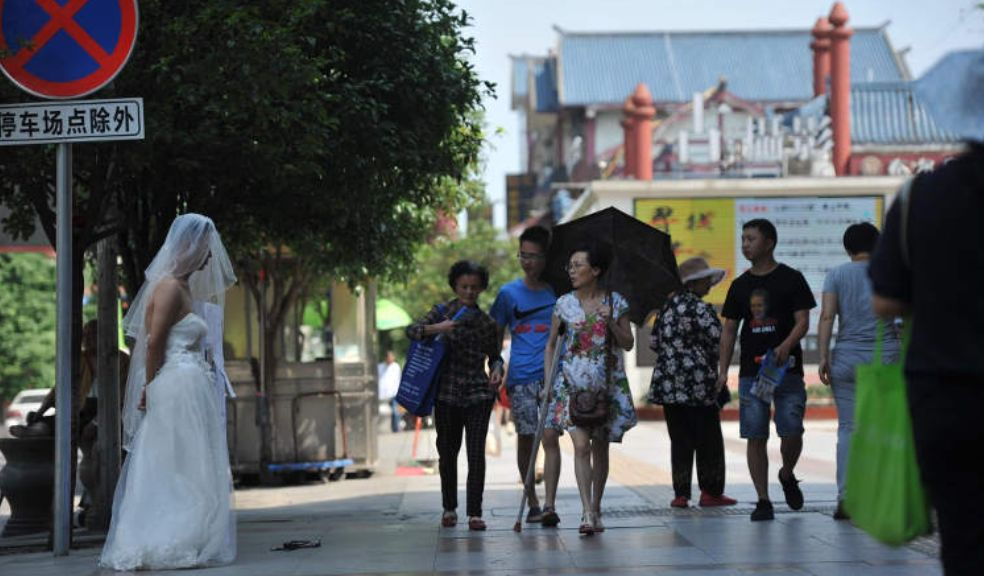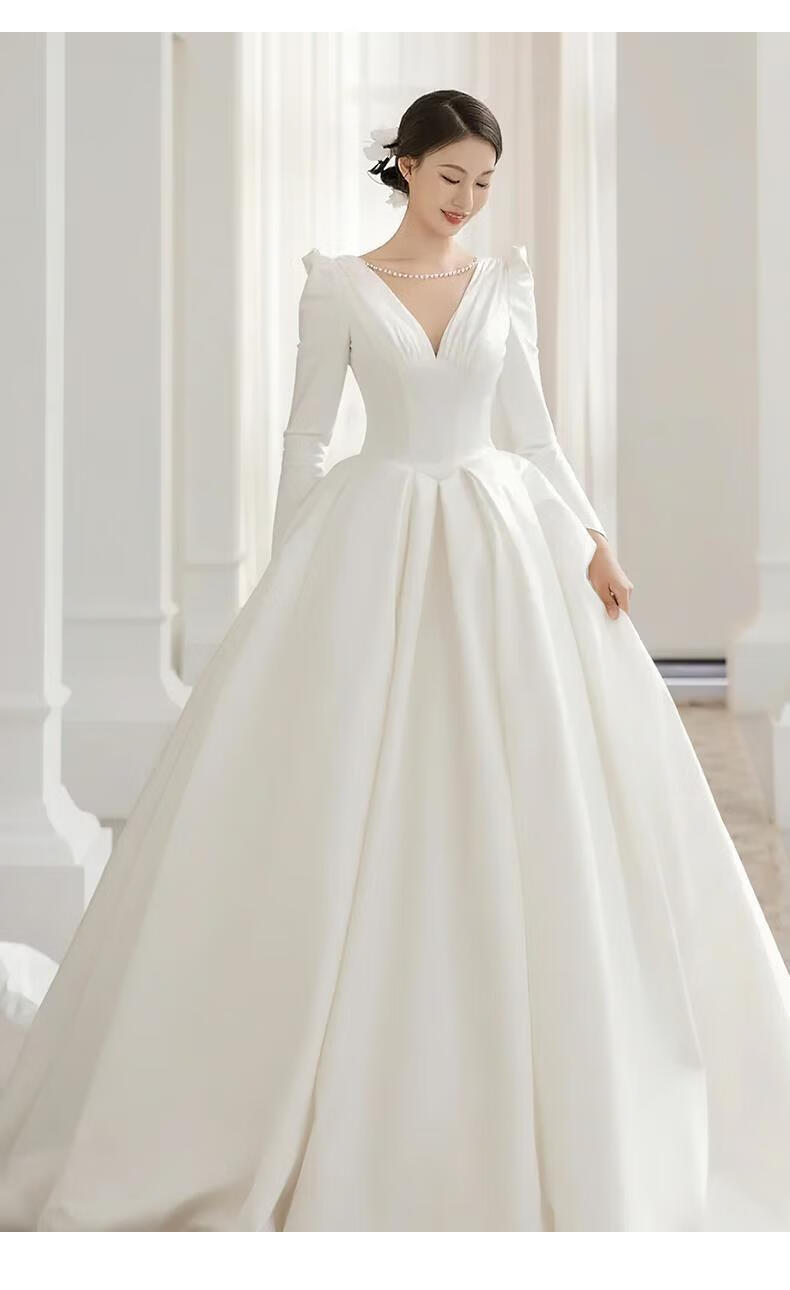Older couples commemorate the big day decades after the fact thanks to a student project, Xu Lin and Zhou Lihua report in Wuhan.
▲More than 400 student volunteers have taken 50,000 wedding photos of about 650 elderly couples, who had no chance to do so when they were young. [Photo provided to China Daily]
After being married for 38 years, Zhang Jianjun and Qin Shumei decided it was time to get a picture. Dressed in formal attire, they are finally ready for their wedding photos.
The photographer, lighting operator and makeup artist are from the younger generation. They communicate with the elderly couple to help them overcome nervousness to ensure good photos.
They are all students from Wuhan University of Engineering Science, in Hubei province, and they are taking wedding photos for those who had no chance to do so when they were young, as a form of community service.
“I’m grateful that I’ve realized my dream to wear a wedding dress,” says Qin, 64, from Shijiazhuang, Hebei province. “Our love is not the intense type, but we believe it’s important to keep each other company.”
While young people today would likely travel to a picturesque destination to have their wedding photos taken by a professional photographer, the older generation kept their big day simple — newlyweds around the 1970s often only took a black-and-white photo as a memento.
It was not until the early 1990s that professional wedding photo studios started to spring up in the Chinese mainland, as the economy blossomed.
Based on that reality, Yu Jinwen, 35, a counselor from the university, initiated the ambitious project in 2015.
It is also because of his grandfather. When he passed away in 2010, the family searched for a decent photo of him but could not find one and had to use the photo on his ID card as a photo for the funeral. It became Yu’s greatest regret in life.
“The program has pleased the elderly and helped improve the overall ability of young students,” Yu says. “China is an aging society and juniors should pay more attention to seniors, many of whom are too shy to express their demands.”

A program for seniors
Once an old man in his 70s contacted Yu and confessed he was embarrassed to go to a photo studio to take wedding photos with his wife.
▲Retired soldier Liu Deming, 88, and his wife Shen Ailan, 81, from Shaoshan, Hunan province, have their wedding photos taken for the first time. [Photo provided to China Daily]
“He told me that even his children had never taken such photos, which he believed were only for young people. He didn’t want his family to know that it was him who wanted to take wedding photos. If we went to them, he could explain it to them as our idea,” Yu says.
“It’s a novel thing for the elderly. Some take their photos in the farm field. Some are embarrassed to walk in the community in wedding suits and want to take the photos at home. Students can easily set up a simple background for them.”
Red is the traditional color for Chinese wedding outfits. He says retired soldiers prefer to wear their green army uniforms, which smartly match the red garments of the wives.
“A grandma called me, cried and said that her husband passed away and these photos were an essential memento of him. At that time, I realized that what we’re doing is just a small deed, but for some elderly folks, it’s very valuable,” Yu adds.
More than 400 student volunteers from the university have taken 50,000 wedding photos of about 650 elderly couples in Hubei and its neighboring provinces. They develop the films, frame the photos and deliver them via courier.
Only 15 students joined the program in the first year but now there are about 100 to 150 volunteers divided into 10 teams every year, who each spend a week on their mission.
Students are trained and arranged with tasks in accordance with their expertise. They often choose a subject of conversation that appeals to the elderly, such as asking about their previous occupation.
In recent years, they started to record the touching love stories of the elderly and post them on social media. Some volunteers continue to aid the program after graduation.
They have different themes every year. For example, in 2019 they shot wedding photos for retired soldiers while Wuhan was holding the Military World Games.
The public-spirited program recently won silver prize at the sixth Chinese Youth Volunteer Service Project Competition.
“Details of how the elderly couples get along with each other have touched the students, who get to learn about love from another perspective,” Yu says.
He says the elderly were from many different walks of life. Students have learned greatly from them, and such exposure is a great boon for them, as they are about to enter society themselves.
“The older generation share their own life experiences, rather than talk about profound principles. When you’re immersed in their stories, you gradually straighten out your thinking about many things.”
Touching love stories
A pack of cigarettes, one kilogram of candy and two tables of relatives — that is how Zhao Xinguo, 74, and his wife Li Luanjiao, 75, got married in 1974. Zhao served in the navy and came home on vacation to register their marriage. They wrote letters to each other to maintain the long-distance relationship.
▲Zhao Xinguo, 74, has been taking good care of his wife Li Luanjiao, 75, since she became completely bedridden in 2019.[Photo provided to China Daily]
In 1982, Li developed rheumatism and her health began to decline. In 2016, she suffered a stroke and required a crutch to move around. Three years later, she became completely bedridden.
Zhao has been taking good care of her the whole time, making meals, feeding and massaging her. Weather permitting, he would carry her on his back downstairs and push her in a wheelchair around the community to enjoy fresh air and sunshine.
In 2019 and 2022, volunteers visited the couple to take wedding photos for them. It was summer, and Zhao bought them watermelons to assuage their thirst.
“We’re very touched that these college students care about elderly people like us. My wife has a bright disposition and enjoyed chatting with the youngsters. It was the first time that she wore makeup,” says Zhao, from Huangmei county, Huanggang city, Hubei province.
He wrote the university a thank-you letter.
“The activity was very meaningful. It brought back sweet memories of when we were young. Also, it has developed the ability of these students, who endured hardships to perform these social services in rural areas.”
Zhao served in the navy for 17 years while Li looked after their son and daughter. He believed he should repay her by taking care of her when she was ill.
He says the secret to a good marriage is that a couple should be tolerant with and cherish each other. It is natural to have quarrels and couples need time to gel again after.
“Our love is very simple. We are just an ordinary couple, and we believe that this is how couples should be,” he says.
Volunteer Zhao Chen, 21, who visited the couple last year, recalls chatting with the duo for about two hours and was greatly touched by their story.
“At my age, some young people think love is like fast food, coming and going quickly, and some have no idea what love is,” Zhao Chen says. “The elderly couple’s love is about being with each other, and offering mutual help and relief in times of difficulty.”
He says these old couples all have wonderful life stories, which are waiting to be discovered by volunteers. The older generation’s serious attitude toward love and work is worth learning.
He was also impressed by another couple that the team filmed. “They smiled happily and imbued us with their enthusiasm. But we later learned that the grandpa only had about three months left before cancer would take his life,” he says.
Tackling difficulties
Yu recalls that the program encountered many difficulties early on.
▲Elderly couples, who had no chance to take wedding photos when they were young, fulfill their dreams, thanks to a program carried out by teachers and students from the Wuhan University of Engineering Science.[Photo provided to China Daily]
The budget has always been tight, but there are good-hearted helpers to lend a hand. For example, one of Yu’s friends, who happened to have closed his wedding photo studio in Wuhan, donated about 100 sets of secondhand wedding dresses.
The university pays for uniforms and insurance for students. Though some offer donations, most funds are raised by students, who sell secondhand items in a flea market on campus, do part-time jobs and pay their own expenses.
At first, when volunteers went into the community to talk to the elderly, many did not trust them, worrying that it was a fraud for money.
Now, the program’s reputation has increased, and besides canvassing, they coordinate with the university’s Communist Youth League of China to contact their counterparts in communities to reach elderly residents, who can also find ads for the program on newspapers and online platforms.
“No pain, no gain. It’s through these difficulties that students have learned about the significance of the project, and overcoming them gives a sense of achievement,” Yu says.
“The program has developed into maturity and can easily be duplicated now. I’m glad to see that other universities and institutions are also running similar projects for the elderly, benefiting the greater population.”


